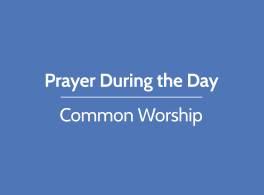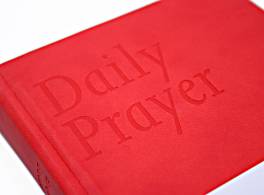Below you will find links to the Psalms from Common Worship: Daily Prayer.
Common Worship: Main Volume includes a version of the Psalter without the optional refrains and psalm prayers.
The Psalter ↑
¶ Introduction ↑
When two or more gather together to worship, psalms may be sung or said in a number of different ways:
¶ by a solo voice while everyone else listens in silence;
¶ by everyone together;
¶ with the verses alternated between one half of the group and the other;
¶ with the verses alternated between the leader and the others;
¶ or responsorially, as a dialogue between the word of God and the response of the people. (In ancient times a cantor or reader recited the verses and the congregation replied with a refrain, sometimes just a simple ‘Alleluia’ as a song of praise, and sometimes a verse taken from the psalm itself, from another psalm, from elsewhere in the Scriptures or even from other sources.)
Some psalms, or parts of psalms, lend themselves to one method rather than another, and those leading worship should consider carefully which will be best in each instance.
Optional refrains – or ‘antiphons’, as they are often called – are provided for use at the beginning and end of each psalm (after the ‘Glory to …’ when this is included), except for those psalms already having certain verses marked by italics as constituting possible refrains. The refrains are usually drawn from the psalm itself, but occasionally from elsewhere in the Psalter. They might first be said or sung by the leader and then repeated by all. In order to facilitate responsorial use, places where the refrain might also be used in the course of the psalm are indicated by the symbol [R]. These have not been set with a rigid consistency (e.g. after every second verse), but have been chosen as far as possible in relation to the sense of the particular psalm and its natural divisions.
Each psalm is also provided with an optional short prayer, which develops a theme from the text. Just as the refrains may be used without these prayers, so too the prayers may be used without the refrains. When they are used, it is desirable that the ‘Glory to …’ be omitted and that a period of silence for individual reflection and prayer be kept at the end of the psalm (after the refrain, when this is included), before the prayer itself is said.
It should be kept in mind that these refrains and prayers are merely suggestions: they may be replaced by other suitable texts, especially those with a particular seasonal emphasis, or they may be omitted altogether.
Notes
1When saying a psalm aloud, the word ‘blessed’ is to be pronounced as two syllables: ‘bless - ed’. Where spelled ‘blest’, the word is pronounced as one syllable.
2A diamond ♦ marks the mid-point in each psalm verse where, traditionally, a pause is observed.
3Each psalm or group of psalms may end with
All Glory to the Father and to the Son
and to the Holy Spirit;
as it was in the beginning is now
and shall be for ever. Amen.
(or)
All Glory to God, Source of all being,
Eternal Word and Holy Spirit;
as it was in the beginning is now
and shall be for ever. Amen.
Common Worship: Daily Prayer, material from which is included here,
is copyright © The Archbishops' Council 2005 and published by Church House Publishing.


